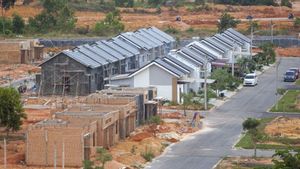JAKARTA In the midst of global turmoil, Indonesia's manufacturing sector is still consistently expansive. This is reflected in Indonesia's Purchasing Managers Index (PMI) in October at the level of 51.5.
Head of the Fiscal Policy Agency of the Ministry of Finance, Febrio Kacaribu, said that this achievement indicates that Indonesia's manufacturing expansion has occurred for the last 26 months in a row. Indonesia's manufacturing expansion is mainly supported by the increasing level of demand and output for production.
"Although it is still expansionary, Indonesia's manufacturing performance has shown a slowdown in the last two months in line with the slowdown in global growth," he explained in his statement Thursday, November 2.
Febrio sees the impact of the global economic slowdown as well as the manufacturing performance of several countries in the contraction zone, such as China at the level of 49.5, Thailand at 47.5, Vietnam at 49.6, Malaysia at the level of 46.8, Australia at 48.2, and the European zone at 43.
Meanwhile, India as one of the economies in the emerging economy (EMs) group and Indonesia's export potential market are still in the expansion zone at the level of 55.5.
Febrio explained that Indonesia's manufacturing performance, which is still expansive, shows Indonesia's economic resilience amid contracting manufacturing in many countries in line with the increase in global risk.
"Although a little slower, sentiment in the Indonesian manufacturing sector as a whole is still positive. We will continue to maintain this achievement through various policy supports to maintain economic stability and anticipate global risks," said Febrio.
Febrio said inflation in October recorded a slight increase of 2.56 percent (yoy) compared to September at the level of 2.28 percent (yoy), driven by rising food price inflation in volatile food. In the midst of a long dry season due to the impact of El Nino, food production generally decreases so that several commodities experience an increase in prices such as rice and various chilies.
اقرأ أيضا:
Government regulated price inflation (administered price) also recorded a slight increase to 2.12 percent (yoy) from 1.99 percent (yoy) in line with the high crude oil price. Meanwhile, the slowdown in core inflation continued to reach 1.91 percent (yoy) from 2 percent (yoy) in September 2023.
In a quick response to controlling food prices, the Government is trying to mitigate the impact of El Nino through efforts to stabilize supply, especially strategic commodities, such as rice to maintain domestic supply adequacy. In addition, market operations policies, low food titles, and price interventions continue to be consistently carried out so that inflation expectations can be maintained.
Febrio said the state budget continues to be optimized as a shock absorber, especially in the midst of pressure caused by the current El Nino phenomenon.
"The government provides additional social protection, including by adding rice aid until the end of 2023 and rolling out El Nino's Direct Cash Assistance (BLT) for November-December to maintain the purchasing power of poor and vulnerable groups," said Febrio.
The English, Chinese, Japanese, Arabic, and French versions are automatically generated by the AI. So there may still be inaccuracies in translating, please always see Indonesian as our main language. (system supported by DigitalSiber.id)
















